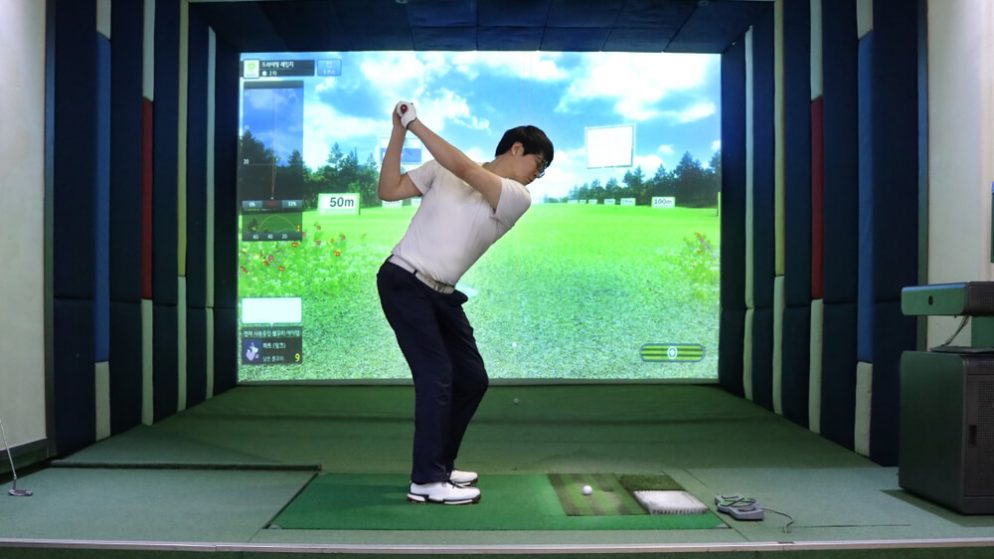

Picture this: Sameer Gupta enters a gaming arcade, holding a golf shaft in his hand. This is not just any game hub, but a golf lounge located near Grand Central Station at a T-Squared,a chain of social sports bars launched by golfer Tiger Woods and music legend Justin Timberlake.
Gupta confidently approaches a tee positioned next to a screen that replicates a Par-3 hole. Using an app on his phone, he places a $20 bet on himself to successfully land his ball in one of three designated spots. If he manages to achieve a hole-in-one, he will win $1,000. On the flipside, if it lands within two specific distances from the hole, he will still earn lesser amounts.
The cameras surrounding the tee box instantly recognize Gupta’s face and, consequently, his skill level. These advanced features are part of the artificial intelligence (AI) system developed by Skill Money Games (SMG), a company co-founded by Sameer Gupta himself and Bryan O’Reilly.
What we cover
SMG is bringing a pioneering AI technology to simulated golf challenges
With founders Sameer Gupta and Bryan O’Reilly behind the brand, SMG is redefining the indoor golf experience. The startup is introducing a patented AI technology that offers personalized, skill-based cash challenges.
At the core of SMG’s innovation lies its advanced AI technology, which analyzes each player’s swing characteristics and performance in real time. Unlike traditional golf tournaments that solely reward the best shots, the startup crafts contests tailored to each player’s skill level.
SMG’s approach meshes together elements of betting and golf skills, creating engaging yet rewarding contests for skilled players. It ensures that both novices and professionals face challenging yet achievable goals, making every swing an opportunity to win and learn.
The gameplay experience
Gupta’s groundbreaking venture currently focuses on indoor golf venues, where players can participate in Closest-to-the-Pin real money contests, catering to golfers of all skill levels. It also has plans to diversify into other simulated games, including bowling, soccer, and darts.
The gameplay experience is both immersive and intuitive. Upon entering a participating venue equipped with SMG’s technology, players are greeted by a simulated golf course displayed on a large screen. Through a user-friendly app, they can wager on their ability to land their ball within designated target areas surrounding the hole.
The AI system can recognize each player’s face, retrieving their handicap and past performance data. Based on this information, the simulated golf game dynamically adjusts the size and payout of the target areas, creating a level playing field where skill, not chance, determines the outcome.
A win-win for all stakeholders
The approach used by Simulated Money Games offers a win-win situation for players, venues, and the sport of golf itself. Players can indulge in the thrill of competing for real cash rewards while sharpening their skills in a controlled environment.
On their end, host venues, such as sports bars, gaming hubs, and even casinos, benefit from increased foot traffic and revenue streams. That’s because SMG’s technology adds an engaging and lucrative dimension to their offerings.
More than that, the simulated golf game has the potential to attract the attention of a broader audience. This way, it introduces newcomers to the world of golf – currently facing competing interests between LIV and PGA Tour – in an approachable and rewarding manner and may ultimately foster growth and interest in the sport.
Legal compliance and regulatory oversight
The gambling industry in the US commanded over $65 billion in gaming revenue in 2023 alone, according to a report by ESPN. With the sheer size of the industry, it calls for a bold approach to incorporate skill and games into a new iGaming venture.
That’s because the term ‘skill games’ is often associated with gaming products that attempt to bypass regulatory requirements in different states.
However, unlike many unlicensed companies involved in sports betting and iGaming, Gupta and his team at SMG have taken a proactive approach to ensure its operations are fully compliant with applicable laws and regulations. On top of that, the company has sought legal opinions for each state where it operates, ensuring that its skill-based gaming model meets the definition of a game of skill rather than one of chance.
Industry experts, including legal scholars and professors specializing in sports law and gaming regulations, have generally endorsed SMG’s offerings as aligning with the legal requirements for skill-based contests.
Simulated Money Games has already received gaming licenses in three states where it currently operates: California, Colorado, and New York. The team also has plans to expand their presence to Texas in the near future.
Interestingly, O’Reilly is the son of a prominent Las Vegas lawyer who previously served as the head of the Nevada Gaming Commission. This background may help the company down the line, especially when seeking licensure in Nevada and neighboring Delaware.
The rise of indoor golf and expanding to other skilled-based games
SMG’s timing couldn’t be more opportune, as the indoor golf market is experiencing a remarkable surge in popularity. According to the National Golf Foundation, the number of indoor golfers in America surpassed that of their outdoor counterparts for the first time last year.
While SMG currently focuses on closest-to-the-hole golf contests, the company plans to expand its offerings into other skill-based sports, such as darts and bowling. Rather than relying solely on simulations, it plans to install its cameras and AI technology directly at actual alleys and bars.
The technology could also be welcomed by operators of casinos and sports betting in Illinois, Nevada, and other gambling-forward states.
Wrapping up
To accelerate its growth and market penetration, SMG has inked strategic partnerships with industry leaders like Full Swing, a renowned manufacturer of golf simulators. Additionally, the company has secured a $5 million funding round led by EBCI Holdings. This comes at a time when boundaries between sports, entertainment, and skill-based gaming continue to blur.

